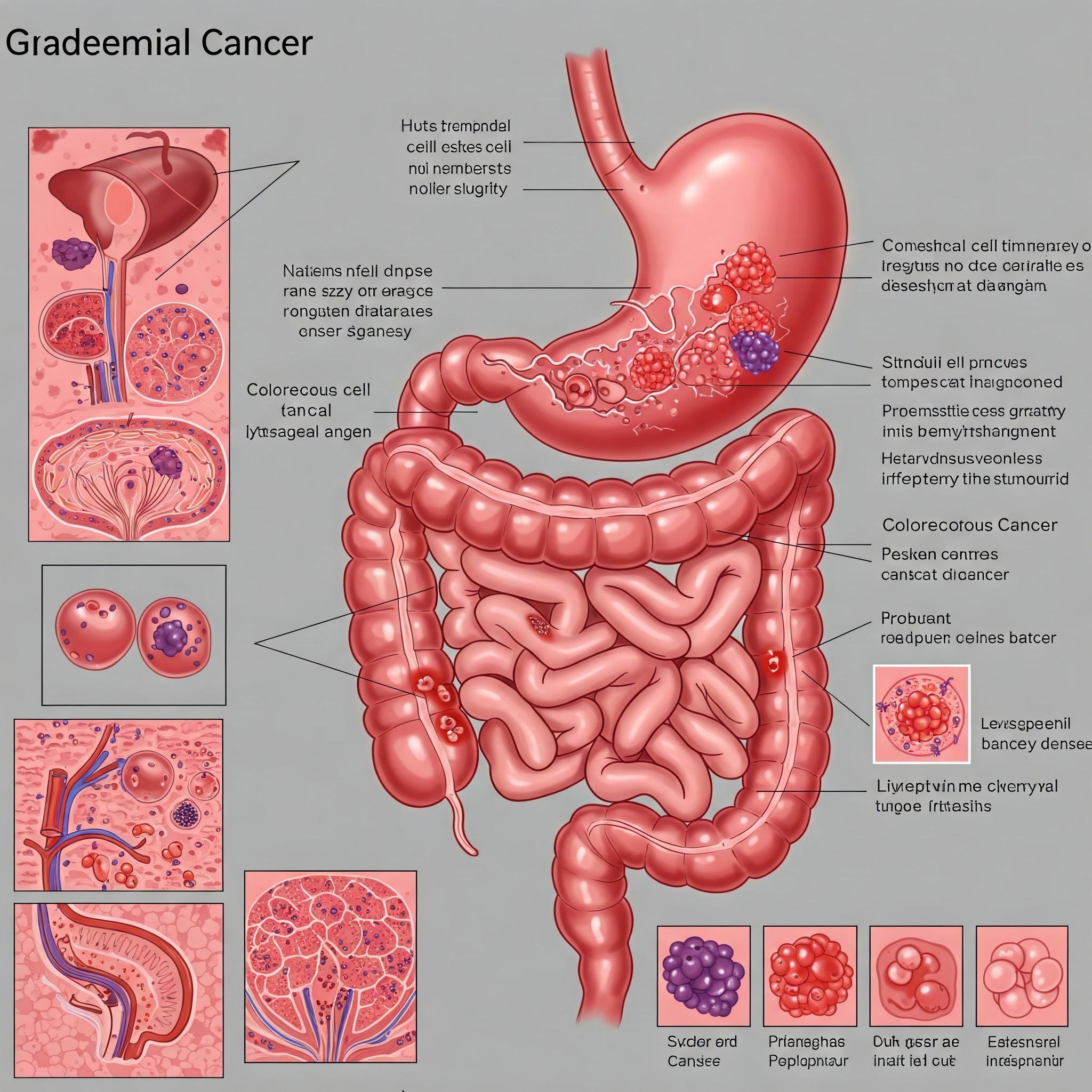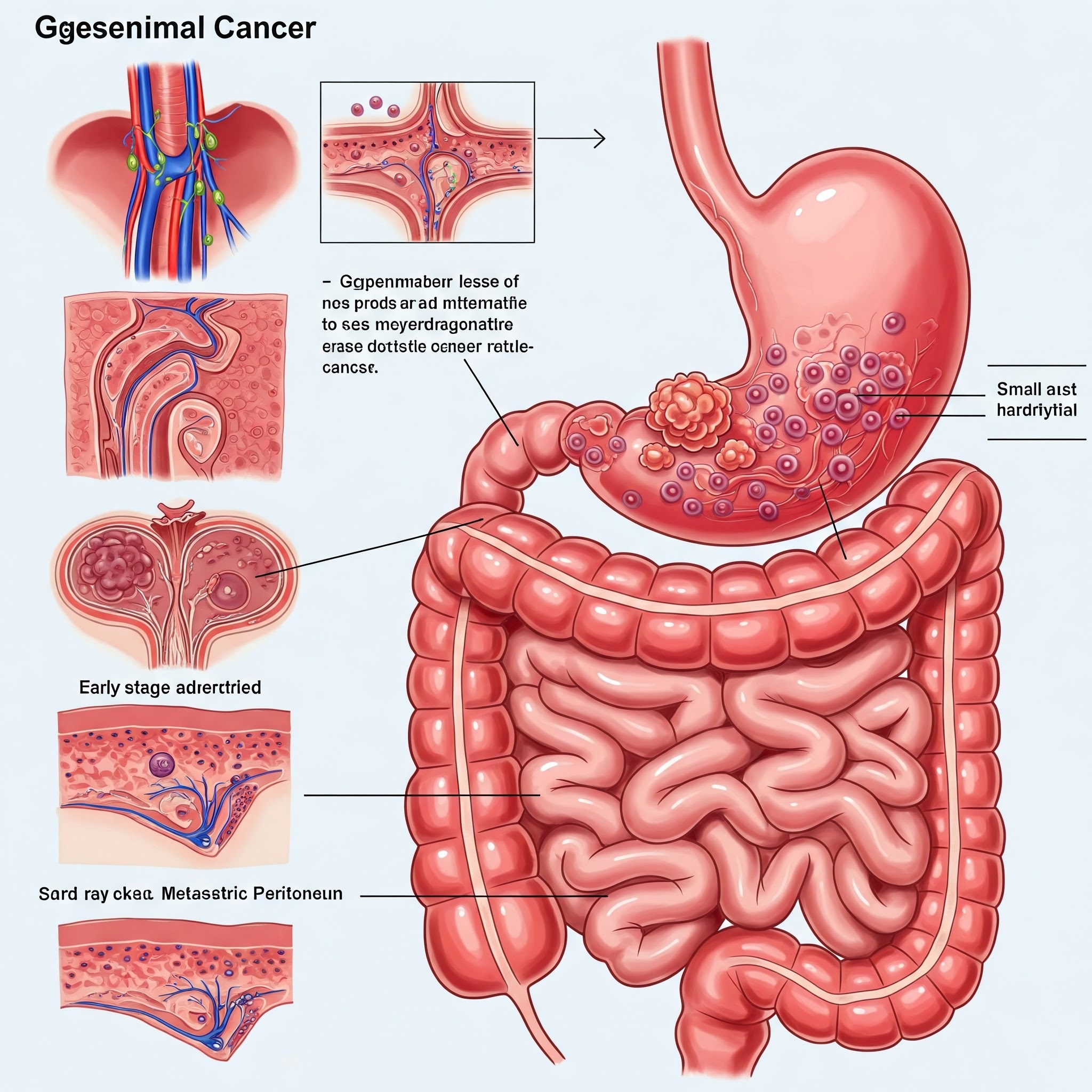Gastro Intestilnal Cancer
Protect your health with early gastrointestinal cancer detection
Expert guidance and comprehensive care for gastrointestinal health
Recognizing the early signs of gastrointestinal cancer, such as persistent abdominal pain, unexplained weight loss, and digestive discomfort, is essential for early detection. Our clinic offers advanced diagnostic services, utilizing cutting-edge imaging techniques and laboratory tests to assess gastrointestinal health accurately. Early gastrointestinal cancer diagnosis significantly improves the gastrointestinal cancer survival rate, offering patients more treatment options and better prognoses.
Our clinic addresses various types of gastrointestinal cancer, including cancers of the esophagus, stomach, liver, pancreas, and colon. Understanding the gastrointestinal cancer causes, such as dietary habits, genetic predisposition, and lifestyle factors, allows for more effective prevention strategies.
Our multidisciplinary team develops personalized gastrointestinal cancer treatment plans, incorporating the latest advancements in oncology. From surgery and chemotherapy to targeted therapies and immunotherapy, we tailor our approach to meet each patient’s unique needs. At Neo-Woman’s, we prioritize compassionate care, empowering women with the knowledge and resources to take control of their gastrointestinal health.


Neo-woman gastrointestinal cancer clinic provides comprehensive care for gastrointestinal health:
Our team of dedicated specialists supports patients through every stage of gastrointestinal cancer diagnosis, treatment, and recovery. We offer expert consultations, advanced diagnostic tools, and personalized care plans to address concerns related to gastrointestinal health. Recognizing the early signs of gastrointestinal cancer, such as persistent indigestion, unexplained weight loss, and changes in bowel habits, is crucial for timely diagnosis. Our clinic utilizes cutting-edge imaging techniques and laboratory tests to ensure accurate and early detection.
Understanding gastrointestinal cancer symptoms and potential causes is essential for prevention and effective treatment. We provide insights into various types of gastrointestinal cancer, including stomach, colorectal, and pancreatic cancers. Our multidisciplinary team designs individualized care plans, incorporating the latest advancements in oncology to optimize the gastrointestinal cancer survival rate.
At Neo-Woman, we are committed to raising awareness about gastrointestinal cancer, emphasizing the importance of regular screenings and proactive health management. Our compassionate care ensures that patients receive the information, support, and treatments necessary to navigate their cancer journey with confidence and hope.
- Comprehensive overview of gastrointestinal (gi) cancers
Gastrointestinal cancers refer to a group of malignancies that affect different organs within the digestive system. These include colorectal, stomach (gastric), pancreatic, liver, and esophageal cancers. Each of these types presents with its own set of symptoms, risk factors, and treatment protocols. Understanding the organ involved is crucial for determining the most effective treatment strategy, as the approach to managing colon cancer differs significantly from that for pancreatic or esophageal cancer.
Here are some of the check up and health screenings that you should get done:
- Pelvic Exam
- Pap Smear (Cervical Cancer Screening)
- Breast Exam
- Blood Pressure Measurement
- Cholesterol Screening
- Bone Density Scan (DXA)
- Blood Sugar Test (Glucose Screening)
- Thyroid Function Tests
- Blood Count (Complete Blood Count, CBC)
* The specific exams and screenings recommended can vary based on a woman’s age, family history, personal health history, and risk factors. It’s essential to discuss your individual healthcare needs and screening schedule with your healthcare provider.
- Advanced surgical options for gi malignancies
Surgery is a cornerstone in the treatment of many GI cancers, and our team employs a wide range of advanced surgical procedures tailored to each type. For colorectal cancer, minimally invasive options such as laparoscopic and robotic-assisted surgery are commonly used to remove tumors with precision and promote faster recovery. In cases of gastric cancer, procedures like gastrectomy combined with lymph node dissection are carried out to ensure complete removal of the disease while evaluating its spread.
- Specialized surgeries for complex gi conditions
When it comes to pancreatic cancer, surgical treatment often involves highly specialized procedures such as the Whipple procedure (pancreaticoduodenectomy), distal pancreatectomy, or total removal of the pancreas, depending on the tumor’s location. Similarly, liver cancer is managed through hepatic resections or, in certain cases, liver transplantation. These surgeries are performed by hepatobiliary surgeons skilled in handling both primary and metastatic tumors. For esophageal cancer, esophagectomy and minimally invasive procedures are used to excise the tumor and maintain the patient’s ability to swallow.
- Understanding risk factors and early detection challenges
Numerous factors can contribute to the development of GI cancers. These include advanced age, hereditary syndromes, and chronic inflammatory conditions such as inflammatory bowel disease. Lifestyle habits also play a role—smoking, excessive alcohol use, obesity, and diets high in processed or red meats can significantly increase the risk. Early detection remains a challenge, particularly for cancers like gallbladder or pancreatic cancer, which often show no clear symptoms in their initial stages and are typically diagnosed late.
- Multidisciplinary treatment approaches
Treatment for gastrointestinal malignancies is multifaceted and tailored to the individual’s diagnosis and overall health. Surgery is often paired with other therapies such as chemotherapy, radiation, targeted drugs, or immunotherapy to improve outcomes and minimize recurrence. In some cases, especially when a cure isn’t possible, palliative care is introduced to help manage pain and improve the patient’s quality of life. A team-based approach involving oncologists, surgeons, radiologists, and palliative specialists ensures that each patient receives well-rounded care.

Frequently asked questions
What are the early signs of gastrointestinal cancer?
Early signs include persistent bloating, abdominal pain, unexplained weight loss, and changes in bowel habits. Early detection improves the survival rate significantly
What are the primary causes of gastrointestinal cancer?
Causes can include genetic predisposition, lifestyle factors like diet, smoking, alcohol consumption, and certain infections like H. pylori.
How is gastrointestinal cancer diagnosed?
Diagnostic methods include endoscopy, colonoscopy, imaging tests like CT scans, and biopsies.
What are the treatment options available?
Treatments range from surgery, chemotherapy, and radiation to targeted and immunotherapy.
What factors influence the gastrointestinal cancer survival rate?
Survival rates depend on cancer type, stage at diagnosis, overall health, and response to treatment.
Disclaimer: Results and patient experiences may vary. These are dependent on a number of factors including age, medical history, lifestyle and more.

Service line
Our locations
Neo-woman clinic
Apte Road
1212, Apte Rd, opp. Centro Hotel, Shirole Road, Shivajinagar, Pune, Maharashtra 411004
Contact us at: 9423039292
Our locations
Neo-woman clinic
Hadapsar
Gandharva Empire, 3rd floor, Above Fab India, Raskar Chowk, Amanora Park, Hadapsar, Pune, Maharashtra 411036
Contact us at: 7030114488
Copyright © 2026 neo-Woman – all rights reserved.
:::| powered by dimakh consultants |:::